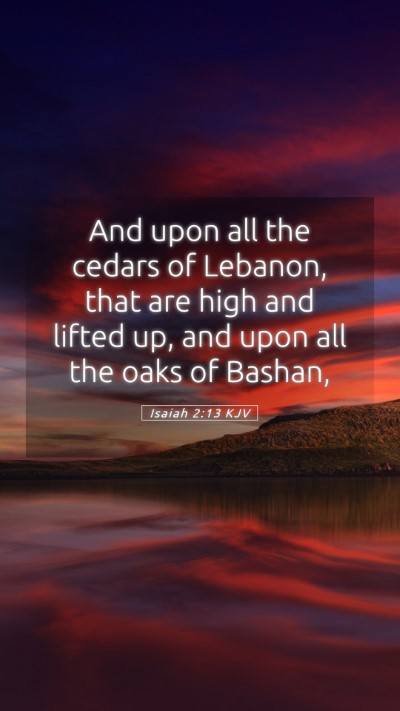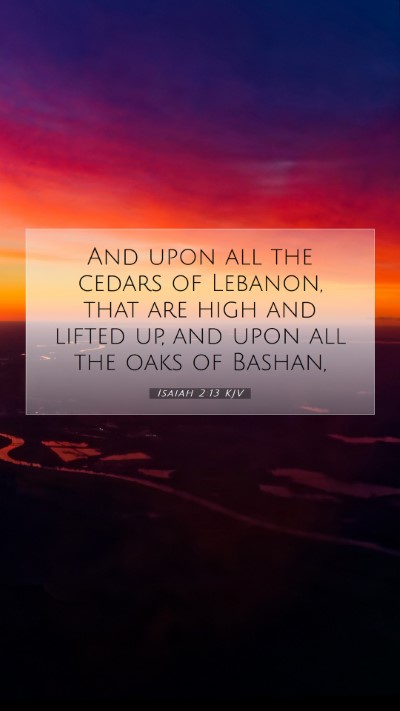Understanding Isaiah 2:13 - A Comprehensive Bible Verse Commentary
Isaiah 2:13 states: "And upon all the cedars of Lebanon, that are high and lifted up, and upon all the oaks of Bashan." In order to grasp the full meaning of this verse, we will analyze it through the insights of renowned public domain commentaries including Matthew Henry, Albert Barnes, and Adam Clarke.
Bible Verse Meaning
The passage serves as part of a larger prophecy filled with themes of judgment and the humility of mankind in the sight of God. Here, the reference to the “cedars of Lebanon” and the “oaks of Bashan” symbolizes the strength and pride of powerful nations and leaders. The imagery conjured reflects not only their physical stature but also their arrogant aspirations regarding their own significance in the world.
Insights from Matthew Henry
Matthew Henry emphasizes the theme of divine judgment over pride. He points out that the cedars, which are known for their height and durability, stand as a metaphor for the might of nations and the pride of people. He suggests that God will humble those who boast in their strength, showing that even the mightiest creations are subject to His will.
Insights from Albert Barnes
Albert Barnes elaborates on the context surrounding this verse, highlighting that the cedars and oaks represent not just physical trees but also the power and glory of the kingdoms they symbolize. Barnes suggests that the prophecy indicates a time when God will manifest His glory and power, thus revealing the futility of relying on human strength and achievements. He links this verse to the broader concept of God’s sovereignty and the eventual overthrow of earthly powers.
Insights from Adam Clarke
According to Adam Clarke, this verse illustrates the contrast between human arrogance and divine authority. Clarke points out that the imagery of cedar and oak conveys ideas of greatness that will inevitably be brought low. The “high and lifted up” aspects serve as reminders of God's power to bring down those who elevate themselves above others.
Bible Verse Interpretations
In essence, Isaiah 2:13 offers substantial commentary on the nature of human pride and the inevitable consequences when one places their trust in worldly power instead of God. For those seeking deeper understanding of Scripture, this narrative encourages a reflective approach to recognizing where human ambition may lead astray.
Related Bible Cross References
- Psalm 37:35-36: Reference to the prosperity of the wicked compared to their downfall.
- Isaiah 10:33-34: God's judgment on the proud and powerful figures.
- James 4:6: "God resists the proud, but gives grace to the humble."
Applying Bible Verses to Daily Life
Understanding important Bible verses such as Isaiah 2:13 can guide believers in their daily lives. It serves as a reminder of humility, urging individuals to recognize the transient nature of worldly success and maintain trust in God’s eternal authority. Incorporating this insight in Bible study groups or through online Bible study may provide fruitful discussions about the place of pride versus humility.
Conclusion
Isaiah 2:13 challenges readers to reflect on their own lives, encouraging them to align their values with the teachings found within Scripture. This comprehensive analysis offers valuable Bible study insights and supports those aiming to delve deeper into the meaning of Bible verses. By exploring the interpretations provided by Matthew Henry, Albert Barnes, and Adam Clarke, readers will gain rich perspectives on understanding Scripture and biblical exegesis.


